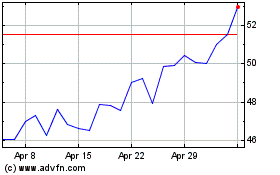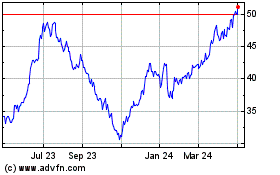By Alison Sider in Chicago and Ted Mann in Washington
Reeling from the coronavirus crisis, U.S. airlines are seeking
over $50 billion in financial assistance from the government, more
than three times the size of the industry's bailout after the Sept.
11 attacks.
The exact form of the aid -- and the amount -- is under
discussion with Trump administration officials and congressional
leaders. A potential aid package could include government-backed
loans, cash grants and other measures including relief from taxes
and fees, according to an airline trade group and others familiar
with the discussions.
"We're going to back the airlines 100%," President Trump said at
a news conference Monday. "We have to back the airlines. It's not
their fault."
Industry trade group Airlines for America, or A4A, also proposed
$8 billion in grants and guarantees for cargo carriers. U.S.
airports are separately seeking $10 billion in assistance to
counter forecast full-year losses already approaching $9 billion,
according to a person familiar with the request.
Airlines are facing an existential crisis, with United Airlines
Holdings Inc. alone estimating its revenue would be down $1.5
billion in March from a year ago and would post a first-quarter
loss. A4A said all seven of the carriers it represents could run
out of money in the second half of the year or sooner.
"We cannot afford to wait long for assistance," A4A said.
Airlines have been stunned by the rapid plunge in their bookings
as the coronavirus pandemic has spread around the world. As the
worst-case scenarios they envisioned just days or weeks ago have
come to pass, carriers have scrambled to make ever deeper cuts to
their schedules.
Major carriers have warned the administration they could become
insolvent as soon as late May without federal help, a person
familiar with the talks said.
The proposed aid package would require congressional approval,
and some lawmakers in both parties have already begun signaling
opposition to what they called a corporate bailout.
"The Swamp will draft a COVID19 corporate bailout. It will not
be good," Rep. Matt Gaetz (R., Fla.) wrote on Twitter Monday,
referring to the illness caused by the novel coronavirus.
Sunday night on Fox News, Rep. Gaetz said "every lobbyist in
Washington right now is planning for the next big bailout push,
whether it's the airline industry or the cruise industry....We do
not need a massive corporate bailout as a consequence of this
virus. We should be thinking about the workers."
Sen. Edward Markey (D., Mass.) said any assistance to the
airlines should come with new rules prohibiting practices like
charging for flight changes as well as protection for workers.
"Any infusion of money to the airlines must have some major
strings attached," he said in a statement. "I will demand these
conditions be met before supporting any airline bailout."
Treasury Secretary Steven Mnuchin said Sunday that the
administration was considering relief packages for a number of
industries but rejected the idea that they would constitute
bailouts.
"If you're providing liquidity to good businesses that just need
liquidity for three to six months, where you're taking collateral
and you have security, that's not a bailout," he said.
Senior leaders at Boeing Co., meanwhile, have been in talks with
congressional and White House officials about financial assistance
for the plane manufacturer and its suppliers, as part of a broader
aid package for the aviation industry, a company executive said
Monday.
"We can get the aviation sector back on its feet faster if there
is assistance," the executive said. Details of any potential
request for assistance couldn't immediately be learned.
Boeing continues to build wide-body aircraft at its Everett,
Wash., factory near Seattle, while production of the narrow-body
737 MAX remains halted amid a protracted grounding following two
deadly crashes.
United said Sunday night that it would cut its planned flying in
half in April and May and is in talks with its unions about steps
that could include furloughs, pay cuts or other measures to reduce
payroll expenses.
Even then, the carrier expects its remaining planes to fly only
a quarter full.
"When medical experts say that our health and safety depends on
people staying home and practicing social distancing, it's nearly
impossible to run a business whose shared purpose is 'Connecting
people. Uniting the world,'" United CEO Oscar Munoz and President
Scott Kirby wrote in a letter to employees Sunday.
Delta Air Lines Inc. and American Airlines Group Inc. have also
announced severe cuts in flying, hiring freezes, and voluntary
unpaid leave for employees.
A4A issued its proposal for more than $50 billion in aid
publicly Monday after circulating it privately in recent days.
While massive, the aid package falls short of the $80 billion
bailout of the auto industry following the 2008 financial
crisis.
The trade group argued that roughly half of the proposed
assistance -- $25 billion -- should come in the form of direct
grants to airlines. The proposal also outlines a $25 billion
program in which the Federal Reserve would purchase financial
instruments from, or provide interest-free loans or loan guarantees
to, the carriers.
It also includes provisions for rebates of excise taxes --
including those on tickets, cargo and fuel -- that airlines paid in
the first quarter and a repeal of those taxes through at least Dec.
31, 2021.
Some lobbying on behalf of the airlines believe that figure
might not be enough, given the likelihood that the disruption to
air travel will last for months, leaving carriers with huge debt
loads and depressed cash flows.
"They might be shooting too low," one person involved in the
talks said.
The Trump administration is using the post-Sept. 11 bailout
passed by Congress in 2001 as a template for the current talks with
carriers, people involved in the discussions said.
Lawmakers in 2001 made $5 billion in direct payments to airlines
after the terrorist attacks that prompted a three-day closure of
North American airspace. They also earmarked up to $10 billion to
support U.S. airlines through a loan program, though only $1.56
billion in guarantees were authorized, including to carriers that
ended up failing.
Some criticized that package for propping up ailing carriers and
delaying consolidation. The program ended up making money for the
government.
U.S. airlines were profitable for a decade before the virus hit
-- a record stretch -- and airline executives had hoped they had
built up enough of a cushion to make it through the hit from the
virus.
But as governments imposed sweeping new restrictions on
international travel and passengers began canceling flights en
masse, the speed and severity of the drop in demand has been
overwhelming.
Airlines are also arguing that they should be permitted to
retain the 7.5% tax on ticket sales that currently goes to support
airport improvements. That has triggered fights with airport
operators that say they depend on that revenue, this person
said.
Airlines have bolstered liquidity in recent weeks with bond
issues and by drawing down existing credit facilities. Alaska Air
Group Inc. said Monday it was seeking another $500 million, having
drawn down a loan just last week.
Executives have also flagged their access to potentially
billions of dollars more by borrowing against aircraft and other
assets such as frequent-flier programs.
U.S. airline shares have more than halved in value over the past
month and continued their decline on Monday, rising only slightly
after the aid request was disclosed. The NYSE Arca Airline Index
fell 16% to its lowest level in seven years.
United's Mr. Munoz and leaders of unions representing the
airline's flight attendants, pilots, mechanics and flight
dispatchers wrote to Mr. Mnuchin and congressional leaders Monday
asking for financial support, saying that the recent travel
restrictions and shrinking demand were putting jobs at risk.
"The financial impact of this crisis on our industry is much
worse than the stark downturn that we saw in the aftermath of the
9/11 attacks," they wrote in a letter. "Financial support that you
provide would allow United to continue paying our employees as we
weather this crisis -- protecting tens of thousands of people from
imposing a temporary furlough."
--Andrew Tangel, Doug Cameron and Alex Leary contributed to this
article.
Write to Alison Sider at alison.sider@wsj.com and Ted Mann at
ted.mann@wsj.com
(END) Dow Jones Newswires
March 16, 2020 19:43 ET (23:43 GMT)
Copyright (c) 2020 Dow Jones & Company, Inc.
Delta Air Lines (NYSE:DAL)
Historical Stock Chart
From Mar 2024 to Apr 2024

Delta Air Lines (NYSE:DAL)
Historical Stock Chart
From Apr 2023 to Apr 2024
